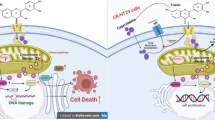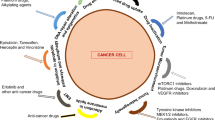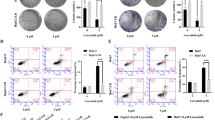Abstract
Histone deacetylase (HDAC) overactivity in colorectal cancer (CRC) promotes cancer progression. In the current study, we showed that 4SC-202, a novel class I HDAC inhibitor (HDACi), potently inhibited survival and proliferation of primary human colon cancer cells and established CRC lines (HT-29, HCT-116, HT-15, and DLD-1). Yet, the same 4SC-202 treatment was non-cytotoxic to colon epithelial cells where HDAC-1/-2 expressions were extremely low. 4SC-202 provoked apoptosis activation in CRC cells, while caspase inhibitors (z-VAD-CHO and z-DVED-CHO) significantly alleviated 4SC-202-exerted cytotoxicity in CRC cells. Meanwhile, 4SC-202 induced dramatic G2-M arrest in CRC cells. Further studies showed that AKT activation might be an important resistance factor of 4SC-202. 4SC-202-induced cytotoxicity was dramatically potentiated with serum starvation, AKT inhibition (by perifosine or MK-2206), or AKT1-shRNA knockdown in CRC cells. On the other hand, exogenous expression of constitutively active AKT1 (CA-AKT1) decreased the sensitivity by 4SC-202 in HT-29 cells. Notably, 4SC-202, at a low concentration, enhanced oxaliplatin-induced in vitro anti-CRC activity. In vivo, we showed that oral gavage of 4SC-202 inhibited HT-29 xenograft growth in nude mice, and when combined with oxaliplatin, its activity was further strengthened. Together, these pre-clinical results indicate that 4SC-202 may be further investigated as a valuable anti-CRC agent/chemo-adjuvant.






Similar content being viewed by others
References
Hubbard JM, Grothey A. Colorectal cancer in 2014: progress in defining first-line and maintenance therapies. Nat Rev Clin Oncol. 2015;12:73–4.
Schmoll HJ, Stein A. Colorectal cancer in 2013: towards improved drugs, combinations and patient selection. Nat Rev Clin Oncol. 2014;11:79–80.
Siegel R, Ma J, Zou Z, Jemal A. Cancer statistics. CA Cancer J Clin. 2014;64:9–29.
McCarthy N. Colorectal cancer: editing an invasion. Nat Rev Cancer. 2014;14:297.
Kuipers EJ, Rosch T, Bretthauer M. Colorectal cancer screening—optimizing current strategies and new directions. Nat Rev Clin Oncol. 2013;10:130–42.
Falkenberg KJ, Johnstone RW. Histone deacetylases and their inhibitors in cancer, neurological diseases and immune disorders. Nat Rev Drug Discov. 2014;13:673–91.
Marks P, Rifkind RA, Richon VM, Breslow R, Miller T, Kelly WK. Histone deacetylases and cancer: causes and therapies. Nat Rev Cancer. 2001;1:194–202.
Hojfeldt JW, Agger K, Helin K. Histone lysine demethylases as targets for anticancer therapy. Nat Rev Drug Discov. 2013;12:917–30.
Jurkin J, Zupkovitz G, Lagger S, Grausenburger R, Hagelkruys A, Kenner L, et al. Distinct and redundant functions of histone deacetylases hdac1 and hdac2 in proliferation and tumorigenesis. Cell Cycle. 2011;10:406–12.
Witt O, Deubzer HE, Milde T, Oehme I. Hdac family: what are the cancer relevant targets? Cancer Lett. 2009;277:8–21.
Mariadason JM. Hdacs and hdac inhibitors in colon cancer. Epigenetics. 2008;3:28–37.
Maes T, Carceller E, Salas J, Ortega A, Buesa C. Advances in the development of histone lysine demethylase inhibitors. Curr Opin Pharmacol. 2015;23:52–60.
Li C, Cui JF, Chen MB, Liu CY, Liu F, Zhang QD, et al. The preclinical evaluation of the dual mtorc1/2 inhibitor ink-128 as a potential anti-colorectal cancer agent. Cancer Biol Ther. 2015;16:34–42.
Qin LS, Jia PF, Zhang ZQ, Zhang SM. Ros-p53-cyclophilin-d signaling mediates salinomycin-induced glioma cell necrosis. J Exp Clin Cancer Res. 2015;34:57.
Qin LS, Yu ZQ, Zhang SM, Sun G, Zhu J, Xu J, et al. The short chain cell-permeable ceramide (c6) restores cell apoptosis and perifosine sensitivity in cultured glioblastoma cells. Mol Biol Rep. 2013;40:5645–55.
Zhu QY, Wang Z, Ji C, Cheng L, Yang YL, Ren J, et al. C6-ceramide synergistically potentiates the anti-tumor effects of histone deacetylase inhibitors via akt dephosphorylation and alpha-tubulin hyperacetylation both in vitro and in vivo. Cell Death Dis. 2011;2:e117.
Duan H, Heckman CA, Boxer LM. Histone deacetylase inhibitors down-regulate bcl-2 expression and induce apoptosis in t(14;18) lymphomas. Mol Cell Biol. 2005;25:1608–19.
Jane EP, Premkumar DR, Addo-Yobo SO, Pollack IF. Abrogation of mitogen-activated protein kinase and akt signaling by vandetanib synergistically potentiates histone deacetylase inhibitor-induced apoptosis in human glioma cells. J Pharmacol Exp Ther. 2009;331:327–37.
Rahmani M, Reese E, Dai Y, Bauer C, Payne SG, Dent P, et al. Coadministration of histone deacetylase inhibitors and perifosine synergistically induces apoptosis in human leukemia cells through akt and erk1/2 inactivation and the generation of ceramide and reactive oxygen species. Cancer Res. 2005;65:2422–32.
Kondapaka SB, Singh SS, Dasmahapatra GP, Sausville EA, Roy KK. Perifosine, a novel alkylphospholipid, inhibits protein kinase b activation. Mol Cancer Ther. 2003;2:1093–103.
Hirai H, Sootome H, Nakatsuru Y, Miyama K, Taguchi S, Tsujioka K, et al. Mk-2206, an allosteric akt inhibitor, enhances antitumor efficacy by standard chemotherapeutic agents or molecular targeted drugs in vitro and in vivo. Mol Cancer Ther. 2010;9:1956–67.
Afifi MM, Austin LA, Mackey MA, El-Sayed MA. Xav939: from a small inhibitor to a potent drug bioconjugate when delivered by gold nanoparticles. Bioconjug Chem. 2014;25:207–15.
Palta M, Czito BG, Willett CG. Colorectal cancer: adjuvant chemotherapy for rectal cancer-an unresolved issue. Nat Rev Clin Oncol. 2014;11:182–4.
Weihong X, Bin X, Yiting Y, Xiaoling Y, Jie S. The novel hdac inhibitor ar-42-induced anti-colon cancer cell activity is associated with ceramide production. Biochem Biophys Res Commun. 2015.
Vivanco I, Sawyers CL. The phosphatidylinositol 3-kinase akt pathway in human cancer. Nat Rev Cancer. 2002;2:489–501.
Chen CS, Weng SC, Tseng PH, Lin HP. Histone acetylation-independent effect of histone deacetylase inhibitors on akt through the reshuffling of protein phosphatase 1 complexes. J Biol Chem. 2005;280:38879–87.
Tonini G, Imperatori M, Vincenzi B, Frezza AM, Santini D. Rechallenge therapy and treatment holiday: different strategies in management of metastatic colorectal cancer. J Exp Clin Cancer Res. 2013;32:92.
Chung KY, Saltz LB. Adjuvant therapy of colon cancer: current status and future directions. Cancer J. 2007;13:192–7.
O’Connell MJ. Oxaliplatin or irinotecan as adjuvant therapy for colon cancer: the results are in. J Clin Oncol. 2009;27:3082–4.
Eggington S, Tappenden P, Pandor A, Paisley S, Saunders M, Seymour M, et al. Cost-effectiveness of oxaliplatin and capecitabine in the adjuvant treatment of stage iii colon cancer. Br J Cancer. 2006;95:1195–201.
Acknowledgments
This research was supported in part by grants from the National Natural Science Foundation of China
Author contributions
All authors carried out the experiments, participated in the design of the study and performed the statistical analysis, conceived the study, and participated in its design and coordination and helped to draft the manuscript. All authors read and approved the final manuscript.
Author information
Authors and Affiliations
Corresponding author
Ethics declarations
All animal procedures were performed according to the IACUC guidelines upon approval by all authors’ institutional review boards. All investigations were conducted according to the NIH regulations
Conflicts of interest
The authors declare that they have no competing interests.
Additional information
Huang Zhijun, Wang Shusheng and Min Han are co- first authors.
Electronic supplementary material
Below is the link to the electronic supplementary material.
Supplementary Figure 1
HCT-15, HCT-116 and DLD1 cells were pre-treated with MK-2206 (5 μM) or perifosine (5 μM) for 1 h, followed by 4SC-202 (1 μM) treatment for 72 h, cell survival was tested by MTT assay (a-c). Experiments were repeated four times in this figure, and similar results were obtained. Error bars indicate SD. *p < 0.05 vs. untreated control (“Ctrl”) group. # p < 0.05 vs. 4SC-202 only group (EPS 693 kb)
Rights and permissions
About this article
Cite this article
Zhijun, H., Shusheng, W., Han, M. et al. Pre-clinical characterization of 4SC-202, a novel class I HDAC inhibitor, against colorectal cancer cells. Tumor Biol. 37, 10257–10267 (2016). https://doi.org/10.1007/s13277-016-4868-6
Received:
Accepted:
Published:
Issue Date:
DOI: https://doi.org/10.1007/s13277-016-4868-6




